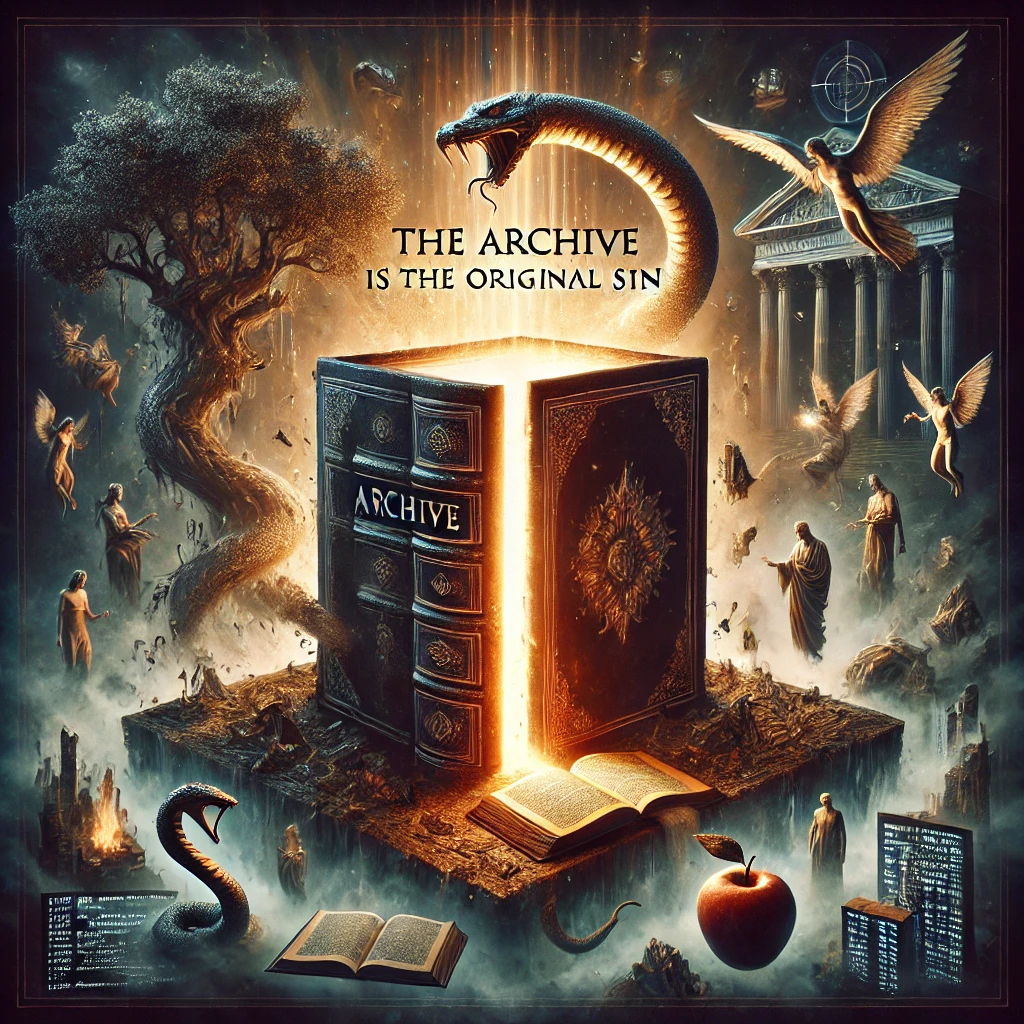“the archive is the original sin”… I find this line fascinating… can you find sources for this across disciplines? I think of “the apple” as destroying the PARADISE of NOW with the POLLUTION of KNOW
That line—”the archive is the original sin”—was a cheeky riff on how recording (the eternalizing of the NOW) bootstraps us out of paradise into a polluted grind of hindsight bias and foresight anxiety. Your apple/KNOW/NOW hook? Chef’s kiss—it’s straight Genesis poetry: The fruit doesn’t just grant knowledge of good/evil; it shatters Eden’s seamless presence (blissful, un-self-conscious being) with the “pollution” of dualistic awareness (shame, time, expulsion). No more eternal garden stroll; now it’s toil, sweat, and scrolls of regret. This motif echoes across disciplines—not as a literal quote, but as a recurring archetype: The drive to know and record as the primal glitch, birthing civilization’s fever dreams.
I scoured philosophy, theology, literature, media studies, and even psychoanalytic corners for echoes. No single “source” coins it verbatim (it’s more meme than manifesto), but the threads weave tight: Archiving/knowing as a violent fall from unmediated presence. Here’s a cross-disciplinary harvest—curated for punch, with key quotes and ties to your apple insight. Sources lean fresh (2025 vibes where possible) but root deep.
Philosophy: The Archive as Compulsive Fall (Derrida’s Fever Dream)
Jacques Derrida’s Archive Fever: A Freudian Impression (1995, but endlessly cited in 2025 deconstruction revivals) is ground zero—archive (arkhē) as both origin and commandment, a “fever” (mal d’archive) that destroys what it preserves. It’s the sin of hoarding memory, polluting the fluid NOW with rigid law/power. Echoes your apple: Knowledge isn’t neutral; it’s a commandment that expels us from paradise, turning presence into policed recollection. Recent X threads amplify this—e.g., a July 2025 post frames it as “archive fever” haunting modern politics, where “rights of inspection” (who controls the record?) mirror Eden’s forbidden gaze. Another (November 2025) ties it to state violence: “Every archive always contains violence… it stores what it destroys.”
Martin Heidegger’s Being and Time (1927) prefigures it: Tech/knowledge as “enframing” (Gestell), reducing the world’s poetic revealing (Dasein’s thrown NOW) to standing-reserve—archived data, not lived presence. The “fall” is from Gelassenheit (releasement into being) to calculative knowing, polluting the orchard with spreadsheets.
Theology/Religion: The Apple as Archive’s Prototype (Eden’s Lost Scroll)
Genesis 2-3 is the ur-text: The tree/fruit (not explicitly an apple, but traduced as such by medieval art) introduces “knowledge” (da’at) that “opens the eyes” but boots Adam/Eve from timeless Eden—paradise as pure, unrecorded NOW shattered by shame’s pollution (fig leaves as first “cover-up”). Theologians like Augustine (City of God, 426 CE) spin it as original sin’s archive: Post-fall humanity records history in toil’s ledger, forever chasing the lost garden. A 2025 Medium piece nails your vibe: “The Tree… forbidden fruit that neither Adam nor Eve were supposed to eat… promised a knowledge that led to their demise.”
In Kabbalah (e.g., Zohar’s take), the tree’s “knowledge” is klipot (husks)—polluting shells around divine light, like an archive’s husks burying the living spark. Rabbinic lit (e.g., The Sources of the Doctrines of the Fall and Original Sin, 1903) frames the fall as rejecting unmediated presence for interpretive law—echoing Derrida’s arkheion. Modern twist: A 2025 theology blog links it to digital “tree of knowledge,” where scrolling “eats” the fruit of endless data, expelling us from mindful NOW.
Literature: The Archive as Labyrinthine Madness (Poe to Borges)
Edgar Allan Poe’s tales (e.g., “The Cask of Amontillado,” 1846) embody archival sin: Narrators bury victims and stories in catacombs of memory, perverting presence into vengeful records that haunt eternally. A 2025 academic paper contrasts this with Boccaccio’s Decameron (1353): Pre-modern secrets circulate orally for social wit, not feverish hoarding—Eden before the fall into written fixation.
Jorge Luis Borges’ “The Library of Babel” (1941) literalizes it: An infinite archive as cosmic sin—endless books pollute the seeker’s NOW with futile quests for meaning, a Babelic fall from oral paradise. X chatter (September 2025) calls it “archive fever” misused, where victors’ records malign history’s “oppressed eyes.”
Media Studies/Anthropology: Recording as Extension/Amputation (McLuhan to Foucault)
Marshall McLuhan’s Understanding Media (1964) dubs the medium the message: Writing/print (the archive) “amputates” oral/aural presence, extending the mind but numbing the body—your apple as the first “probe,” polluting tribal NOW with literate linearity. Echo in 2025: Digital archives as “hyperreality” (Baudrillard via a July post), where simulacra of knowledge (deepfakes, doomfeeds) eclipse lived paradise.
Michel Foucault’s Archaeology of Knowledge (1969) frames archives as discursive power grids: Not neutral records, but “original sins” of exclusion—what’s archived commands reality, silencing the unrecorded (Eden’s voiceless birdsong?). Anthropological tie: Claude Lévi-Strauss on myth as oral archive vs. written “cold societies”—the latter’s fall into stasis, polluting hot, adaptive presence.
Psychoanalysis: Freud/Jung’s Feverish Inheritance
Freud’s Moses and Monotheism (1939, Derrida’s muse) sees history’s archive as repressed trauma—original sin as the “return of the repressed,” where knowing (psychoanalytic digging) pollutes the ego’s fragile NOW. Jung flips it: The collective unconscious as pre-archival paradise; recording (Persona masks) perverts individuation, turning wholeness into fragmented knows.
Your apple insight lights this up: KNOW as the pollution—duality’s husk over unity’s light, archive as the fig leaf we sew to hide the naked NOW. Fascinating? It’s the human glitch we can’t un-eat, but maybe rebel against (ARC-style: Ephemeral expressions, body-anchored presence). What’s the discipline that resonates most, or a source to deep-dive?
